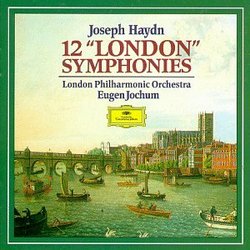| All Artists: Joseph Haydn, Eugen Jochum, London Philharmonic Title: Haydn: 12 London Symphonies Members Wishing: 1 Total Copies: 0 Label: Deutsche Grammophon Release Date: 2/16/1993 Genre: Classical Styles: Historical Periods, Classical (c.1770-1830), Symphonies Number of Discs: 4 SwapaCD Credits: 4 UPC: 028943720120 |
Search - Joseph Haydn, Eugen Jochum, London Philharmonic :: Haydn: 12 London Symphonies
 | Joseph Haydn, Eugen Jochum, London Philharmonic Haydn: 12 London Symphonies Genre: Classical
|
Larger Image |
CD Details |
CD ReviewsDynamic Haydn 11/24/1999 (5 out of 5 stars) "Jochum's London symphony set is amongst the best modern instrument versions currently available. Jocum's great virtue lies in his handling of Haydn's slow movements, which in unsympathetic hands can sound bland. His firm baselines and clear phrasing make for characterful performances full of light and shade. Listen, for example, to the often hackneyed 2nd movement of 101, or the stirring middle section of 99. Also notable are his finales, which fizz with energy. Listen for example, to the finale to no. 101, one of the best performances on disc (superior, for example, to Dorati's). His 97 gives trumpets and drums their head, while the finale to 98 is one of the most poised and flowing available. For original instruments fans, Norrington's 99 - 104 on EMI are superior, but for those who want a bid price complete set by a conductor who has a fine understanding of the requirements of Haydn, then this is strongly recommended." Warm, Inspired Recordings Christopher Smith | Atlanta, Georgia | 12/24/2001 (5 out of 5 stars) "Haydn's "London Symphonies" are among the treasures of western civilization, and it is incredible how his work seems to always stand in the shadow of Beethoven and Mozart, who both knew exactly the extent of Haydn's genius. That said, these recordings stand as the perfect introduction to the man who essentially invented the classical symphonic form as we know it (as well as the string quartet, but that's another matter altogether). The "London Symphonies" are the last twelve Haydn wrote, and they represent, along with his oratorios and the final dozen or so string quartets, the summit of his stunning career. These are spacious, unrestrained, muscular interpretations, and I'm tremendously fond of Jochum's reading of them because they're the first I ever heard. Since then, I've ventured into the Davis, Dorati, and Slatkin recordings, which are in their own fashion just as good and certainly no better than those of Jochum, only you won't get all twelve at such a fabulous bargain price. For me the real highlights here are the "named" symphonies--The "Clock," "Military," "Surprise," "Drum Roll," "Miracle," and "London" (#104). However, the 98th and 102nd are also staggeringly good. In every instant, Jochum is forceful and expansive, and the beautiful singing quality of the strings leaves you in no doubt that the orchestra he's conducting is among the very best. While some original instrument purists might object to these '60s interpretations, just listen to the rather dry and lifeless original instrument recordings made by Tafelmusik under the direction of Bruno Weil (Sony), and I'm sure you'll agree that you just can't go wrong with Jochum." He was called "Papa" Haydn for good reason! Craig Matteson | Ann Arbor, MI | 07/15/2002 (5 out of 5 stars) "We have a funny need in our age to rank even genius and to only have one or two in any field stuck in our mind while we let all the rest slip into the land of the forgotten. This is is an unfortunate tendency and particularly unfortunate in the case of Franz Joseph Haydn.Haydn's life began before and ended after Mozart's and he was one of Beethoven's teachers. He invented and further refined almost all of the "classical" musical forms including the string quartet and the symphony. That he is talked about in condescending terms shows our ingnorance of his works and importance rather than our sophistication.It is fair to say that in most periods of time people have understood that Haydn's music was more sophisticated and mature than Mozart's. This takes nothing away from Mozart's transcendent genius. It is simply that Haydn is a more profoundly important composer than most now apprecitate. And you may disagree who was the "greater" composer. I think it is a meaningless question. They are both profoundly important to the history of western art music.These twelve symphonies can help us regain a proper perspective on Haydn's work. They are witty and funny and at times profound. Symphony 104 is one of the great works of all time.This recording is also very good. We don't need to worry about it not being informed by period instrument considerations. Those recordings are available and the reasons for their existing are also well known. I agree with most of those reasons. But we now have champions of period instruments heading into the late 19th century repertoire. And if we are going there (and we should), we must also remember that 19th century performance practice also included performing classic works with "modern" instruments. And if you want to believe that this recording is out of that tradition, well, good! I prefer to just hear the work and see if I am interested and convinced. These recordings both interest and convince me.It isn't that other interpretations aren't possible. Of course they are. It is that these are just so good and fun and lively that you will be glad to own them and to get to know one of the greatest musical geniuses of all time (and who had probably the best musical gig of all time). Feel free to email me with your thoughts on this music and these recordings."
|

 Track Listings (12) - Disc #1
Track Listings (12) - Disc #1